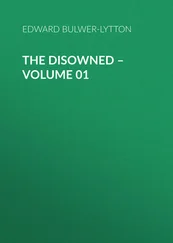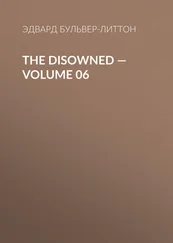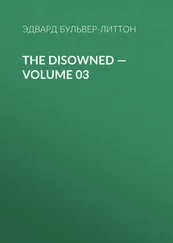Эдвард Бульвер-Литтон - The Disowned — Complete
Здесь есть возможность читать онлайн «Эдвард Бульвер-Литтон - The Disowned — Complete» — ознакомительный отрывок электронной книги совершенно бесплатно, а после прочтения отрывка купить полную версию. В некоторых случаях можно слушать аудио, скачать через торрент в формате fb2 и присутствует краткое содержание. Жанр: foreign_prose, literature_19, Европейская старинная литература, foreign_antique, на английском языке. Описание произведения, (предисловие) а так же отзывы посетителей доступны на портале библиотеки ЛибКат.
- Название:The Disowned — Complete
- Автор:
- Жанр:
- Год:неизвестен
- ISBN:нет данных
- Рейтинг книги:5 / 5. Голосов: 1
-
Избранное:Добавить в избранное
- Отзывы:
-
Ваша оценка:
- 100
- 1
- 2
- 3
- 4
- 5
The Disowned — Complete: краткое содержание, описание и аннотация
Предлагаем к чтению аннотацию, описание, краткое содержание или предисловие (зависит от того, что написал сам автор книги «The Disowned — Complete»). Если вы не нашли необходимую информацию о книге — напишите в комментариях, мы постараемся отыскать её.
The Disowned — Complete — читать онлайн ознакомительный отрывок
Ниже представлен текст книги, разбитый по страницам. Система сохранения места последней прочитанной страницы, позволяет с удобством читать онлайн бесплатно книгу «The Disowned — Complete», без необходимости каждый раз заново искать на чём Вы остановились. Поставьте закладку, и сможете в любой момент перейти на страницу, на которой закончили чтение.
Интервал:
Закладка:
There can be no education in which the lessons of the world do not form a share. Experience, in expanding Algernon’s powers, had ripened his virtues. Nor had the years which had converted knowledge into wisdom failed in imparting polish to refinement. His person had acquired a greater grace, and his manners an easier dignity than before. His noble and generous mind had worked its impress upon his features and his mien; and those who could overcome the first coldness and shrinking hauteur of his address found it required no minute examination to discover the real expression of the eloquent eye and the kindling lip.
He had not been long returned before he found two enemies to his tranquillity,—the one was love, the other appeared in the more formidable guise of a claimant to his estate. Before Algernon was aware of the nature of the latter he went to consult with his lawyer.
“If the claim be just, I shall not, of course, proceed to law,” said Mordaunt.
“But without the estate, sir, you have nothing!”
“True,” said Algernon, calmly.
But the claim was not just, and to law he went.
In this lawsuit, however, he had one assistant in an old relation, who had seen, indeed, but very little of him, but who compassionated his circumstances, and above all hated his opponent. This relation was rich and childless; and there were not wanting those who predicted that his money would ultimately discharge the mortgages and repair the house of the young representative of the Mordaunt honours. But the old kinsman was obstinate, self-willed, and under the absolute dominion of patrician pride; and it was by no means improbable that the independence of Mordaunt’s character would soon create a disunion between them, by clashing against the peculiarities of his relation’s temper.
It was a clear and sunny morning when Linden, tolerably recovered of his hurt, set out upon a sober and aged pony, which after some natural pangs of shame he had hired of his landlord, to Mordaunt Court.
Mordaunt’s house was situated in the midst of a wild and extensive park, surrounded with woods, and interspersed with trees of the stateliest growth, now scattered into irregular groups, now marshalled into sweeping avenues; while, ever and anon, Linden caught glimpses of a rapid and brawling rivulet, which in many a slight but sounding waterfall gave a music strange and spirit-like to the thick copses and forest glades through which it went exulting on its way. The deer lay half concealed by the fern among which they couched, turning their stately crests towards the stranger, but not stirring from their rest; while from the summit of beeches which would have shamed the pavilion of Tityrus the rooks—those monks of the feathered people—were loud in their confused but not displeasing confabulations.
As Linden approached the house, he was struck with the melancholy air of desolation which spread over and around it: fragments of stone, above which clomb the rank weed, insolently proclaiming the triumph of Nature’s meanest offspring over the wrecks of art; a moat dried up; a railing once of massive gilding, intended to fence a lofty terrace on the right from the incursions of the deer, but which, shattered and decayed, now seemed to ask with the satirist,—
“To what end did our lavish ancestors
Erect of old these stately piles of ours?”
—a chapel on the left, perfectly in ruins,—all appeared strikingly to denote that time had outstripped fortune, and that the years, which alike hallow and destroy, had broken the consequence, in deepening the antiquity, of the House of Mordaunt.
The building itself agreed but too well with the tokens of decay around it; most of the windows were shut up, and the shutters of dark oak, richly gilt, contrasted forcibly with the shattered panes and mouldered framing of the glass. It was a house of irregular architecture. Originally built in the fifteenth century, it had received its last improvement, with the most lavish expense, during the reign of Anne; and it united the Gallic magnificence of the latter period with the strength and grandeur of the former; it was in a great part overgrown with ivy, and, where that insidious ornament had not reached, the signs of decay, and even ruin, were fully visible. The sun itself, bright and cheering as it shone over Nature, making the green sod glow like emeralds, and the rivulet flash in its beam, like one of those streams of real light, imagined by Swedenborg in his visions of heaven, and clothing tree and fell, brake and hillock, with the lavish hues of infant summer,—the sun itself only made more desolate, because more conspicuous, the venerable fabric, which the youthful traveller frequently paused more accurately to survey, and its laughing and sportive beams playing over chink and crevice, seemed almost as insolent and untimeous as the mirth of the young mocking the silent grief of some gray-headed and solitary mourner.
Clarence had now reached the porch, and the sound of the shrill bell he touched rang with a strange note through the general stillness of the place. A single servant appeared, and ushered Clarence through a screen hall, hung round with relics of armour, and ornamented on the side opposite the music gallery with a solitary picture of gigantic size, and exhibiting the full length of the gaunt person and sable steed of that Sir Piers de Mordaunt who had so signalized himself in the field in which Henry of Richmond changed his coronet for a crown. Through this hall Clarence was led to a small chamber clothed with uncouth and tattered arras, in which, seemingly immersed in papers, he found the owner of the domain.
“Your studies,” said Linden, after the salutations of the day, “seem to harmonize with the venerable antiquity of your home;” and he pointed to the crabbed characters and faded ink of the papers on the table.
“So they ought,” answered Mordaunt, with a faint smile; “for they are called from their quiet archives in order to support my struggle for that home. But I fear the struggle is in vain, and that the quibbles of law will transfer into other hands a possession I am foolish enough to value the more from my inability to maintain it.”
Something of this Clarence had before learned from the communicative gossip of his landlady; and less desirous to satisfy his curiosity than to lead the conversation from a topic which he felt must be so unwelcome to Mordaunt, he expressed a wish to see the state apartments of the house. With something of shame at the neglect they had necessarily experienced, and something of pride at the splendour which no neglect could efface, Mordaunt yielded to the request, and led the way up a staircase of black oak, the walls and ceiling of which were covered with frescoes of Italian art, to a suite of apartments in which time and dust seemed the only tenants. Lingeringly did Clarence gaze upon the rich velvet, the costly mirrors, the motley paintings of a hundred ancestors, and the antique cabinets, containing, among the most hoarded relics of the Mordaunt race, curiosities which the hereditary enthusiasm of a line of cavaliers had treasured as the most sacred of heirlooms, and which, even to the philosophical mind of Mordaunt, possessed a value he did not seek too minutely to analyze. Here was the goblet from which the first prince of Tudor had drunk after the field of Bosworth. Here the ring with which the chivalrous Francis the First had rewarded a signal feat of that famous Robert de Mordaunt, who, as a poor but adventurous cadet of the house, had brought to the “first gentleman of France” the assistance of his sword. Here was the glove which Sir Walter had received from the royal hand of Elizabeth, and worn in the lists upon a crest which the lance of no antagonist in that knightly court could abase. And here, more sacred than all, because connected with the memory of misfortune, was a small box of silver which the last king of a fated line had placed in the hands of the gray-headed descendant of that Sir Walter after the battle of the Boyne, saying, “Keep this, Sir Everard Mordaunt, for the sake of one who has purchased the luxury of gratitude at the price of a throne!”
Читать дальшеИнтервал:
Закладка:
Похожие книги на «The Disowned — Complete»
Представляем Вашему вниманию похожие книги на «The Disowned — Complete» списком для выбора. Мы отобрали схожую по названию и смыслу литературу в надежде предоставить читателям больше вариантов отыскать новые, интересные, ещё непрочитанные произведения.
Обсуждение, отзывы о книге «The Disowned — Complete» и просто собственные мнения читателей. Оставьте ваши комментарии, напишите, что Вы думаете о произведении, его смысле или главных героях. Укажите что конкретно понравилось, а что нет, и почему Вы так считаете.












